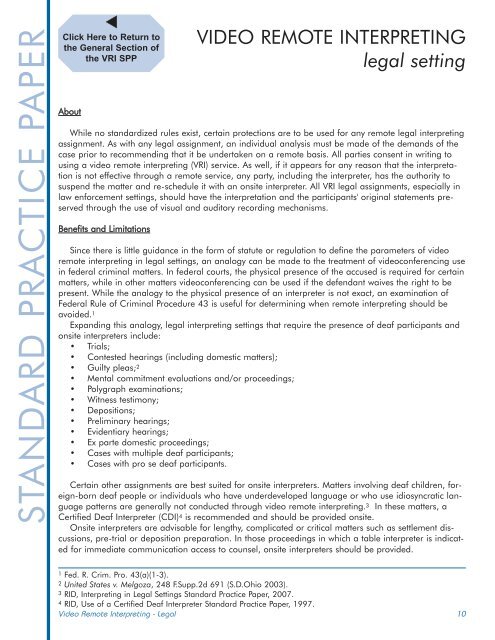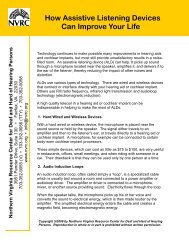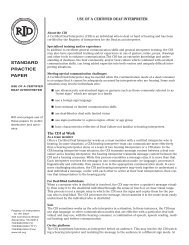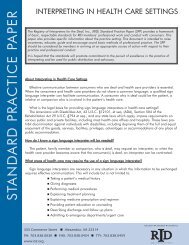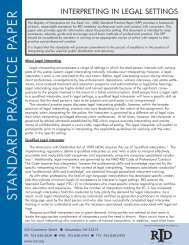Video Remote Interpreting Standard Practice Paper - Registry of ...
Video Remote Interpreting Standard Practice Paper - Registry of ...
Video Remote Interpreting Standard Practice Paper - Registry of ...
You also want an ePaper? Increase the reach of your titles
YUMPU automatically turns print PDFs into web optimized ePapers that Google loves.
STANDARD PRACTICE PAPER<br />
⊳<br />
Click Here to Return to<br />
the General Section <strong>of</strong><br />
the VRI SPP<br />
About<br />
While no standardized rules exist, certain protections are to be used for any remote legal interpreting<br />
assignment. As with any legal assignment, an individual analysis must be made <strong>of</strong> the demands <strong>of</strong> the<br />
case prior to recommending that it be undertaken on a remote basis. All parties consent in writing to<br />
using a video remote interpreting (VRI) service. As well, if it appears for any reason that the interpretation<br />
is not effective through a remote service, any party, including the interpreter, has the authority to<br />
suspend the matter and re-schedule it with an onsite interpreter. All VRI legal assignments, especially in<br />
law enforcement settings, should have the interpretation and the participants' original statements preserved<br />
through the use <strong>of</strong> visual and auditory recording mechanisms.<br />
Benefits and Limitations<br />
VIDEO REMOTE INTERPRETING<br />
legal setting<br />
Since there is little guidance in the form <strong>of</strong> statute or regulation to define the parameters <strong>of</strong> video<br />
remote interpreting in legal settings, an analogy can be made to the treatment <strong>of</strong> videoconferencing use<br />
in federal criminal matters. In federal courts, the physical presence <strong>of</strong> the accused is required for certain<br />
matters, while in other matters videoconferencing can be used if the defendant waives the right to be<br />
present. While the analogy to the physical presence <strong>of</strong> an interpreter is not exact, an examination <strong>of</strong><br />
Federal Rule <strong>of</strong> Criminal Procedure 43 is useful for determining when remote interpreting should be<br />
avoided. 1<br />
Expanding this analogy, legal interpreting settings that require the presence <strong>of</strong> deaf participants and<br />
onsite interpreters include:<br />
• Trials;<br />
• Contested hearings (including domestic matters);<br />
• Guilty pleas; 2<br />
• Mental commitment evaluations and/or proceedings;<br />
• Polygraph examinations;<br />
• Witness testimony;<br />
• Depositions;<br />
• Preliminary hearings;<br />
• Evidentiary hearings;<br />
• Ex parte domestic proceedings;<br />
• Cases with multiple deaf participants;<br />
• Cases with pro se deaf participants.<br />
Certain other assignments are best suited for onsite interpreters. Matters involving deaf children, foreign-born<br />
deaf people or individuals who have underdeveloped language or who use idiosyncratic language<br />
patterns are generally not conducted through video remote interpreting. 3 In these matters, a<br />
Certified Deaf Interpreter (CDI) 4 is recommended and should be provided onsite.<br />
Onsite interpreters are advisable for lengthy, complicated or critical matters such as settlement discussions,<br />
pre-trial or deposition preparation. In those proceedings in which a table interpreter is indicated<br />
for immediate communication access to counsel, onsite interpreters should be provided.<br />
1 Fed. R. Crim. Pro. 43(a)(1-3).<br />
2 United States v. Melgoza, 248 F.Supp.2d 691 (S.D.Ohio 2003).<br />
3 RID, <strong>Interpreting</strong> in Legal Settings <strong>Standard</strong> <strong>Practice</strong> <strong>Paper</strong>, 2007.<br />
4 RID, Use <strong>of</strong> a Certified Deaf Interpreter <strong>Standard</strong> <strong>Practice</strong> <strong>Paper</strong>, 1997.<br />
<strong>Video</strong> <strong>Remote</strong> <strong>Interpreting</strong> - Legal 10


